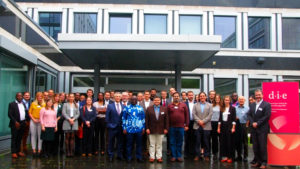
On 1-2 October 2019, the 8th International Workshop on Domestic Revenue Mobilization took place at the German Development Institute / Deutsches Institut für Entwicklungspolitk (DIE) in Bonn. This year’s workshop was organized jointly with the International Monetary Fund (IMF) and had a specific focus on “Taxation and Digitalization”.
As in previous years, the workshop brought together people from different institutions shaping the international tax agenda. Petra Schmidt, Head of division at the Federal Ministry for Economic Cooperation and Development (BMZ), introduced the topic by referring to the challenges domestic revenue mobilisation encounters when facing an increasingly digitalized economy. Alex Klemm, Deputy Division Chief at the IMF, and Christian von Haldenwang, senior researcher at DIE, highlighted in the opening of the workshop the game-changing role that digitalization could play for tax policy and tax administration.
The subsequent presentations, discussions and panels shed light on two key dimensions of the topic: First, digitalization has the power to lead to a profound reshaping of the fiscal contract between taxpayers and the state. Second, tax authorities world-wide are challenged by new business models. Public debate tends to focus on big global players such as Google or Amazon, but the digitalized economy is a universal phenomenon that permeates all economic sectors in all countries.

 The word digitalisation is on its way to become a buzzword that is not only used by techies but also by development professionals around the world. Just two years ago, in 2016, the World Bank devoted the World Development Report (WDR) to Digital Dividends, referring to the distribution of digitalisation benefits to a broader population. The WDR suggested inclusion, efficiency, and innovation as the main mechanisms through which digital technologies can promote development.
The word digitalisation is on its way to become a buzzword that is not only used by techies but also by development professionals around the world. Just two years ago, in 2016, the World Bank devoted the World Development Report (WDR) to Digital Dividends, referring to the distribution of digitalisation benefits to a broader population. The WDR suggested inclusion, efficiency, and innovation as the main mechanisms through which digital technologies can promote development.